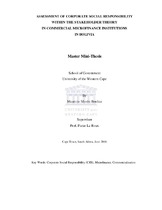| dc.contributor.advisor | Le Roux, Pieter | |
| dc.contributor.author | Benitez, Mauricio Moron | |
| dc.contributor.other | | |
| dc.contributor.other | Faculty of Economics and Management Sciences | |
| dc.date.accessioned | 2013-10-18T12:57:09Z | |
| dc.date.available | 2009/10/22 09:39 | |
| dc.date.available | 2009/10/22 | |
| dc.date.available | 2013-10-18T12:57:09Z | |
| dc.date.issued | 2006 | |
| dc.identifier.uri | http://hdl.handle.net/11394/2297 | |
| dc.description | Masters in Public Administration - MPA | en_US |
| dc.description.abstract | Currently, some microfinance institutions in Bolivia are adopting Corporate Social Responsibility (CSR), a concept whereby companies integrate social and environmental concerns in their business operations and publish the results. CSR is applied mostly by big companies in the North and in sectors more in the eye of the public, such as oil production or textile and apparel. Bolivia has been the pioneer in the commercialization of microfinance through microfinance NGO transformations. The objectives of this investigation was to asses and compare the reasons why the selected Bolivian commercial MFI's were engaged, or not engaged, in CSR. Secondly, to determine which stakeholders are more relevant for each MFI analysed, assessing how they influenced the decision to adopt or not adopt CSR and thirdly, to compare the current social performance of the selected MFI's within the framework of corporate social responsibility. | en_US |
| dc.language.iso | en | en_US |
| dc.publisher | University of the Western Cape | en_US |
| dc.subject | Corporate social responsibility | en_US |
| dc.subject | Microfinance | en_US |
| dc.title | Assessment of corporate social responsibility within the stakeholder theory in commercial microfinance instittutions in Bolivia | en_US |
| dc.type | Thesis | en_US |
| dc.rights.holder | University of the Western Cape | en_US |
| dc.description.country | South Africa | |

